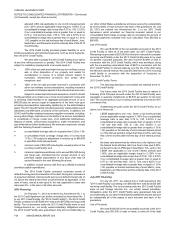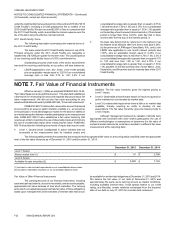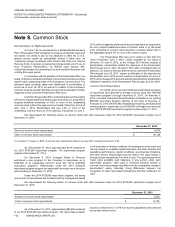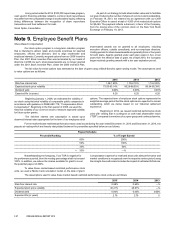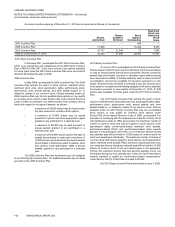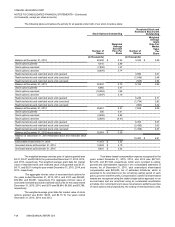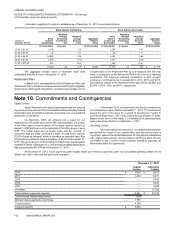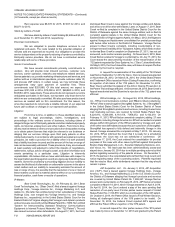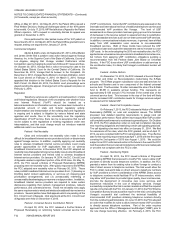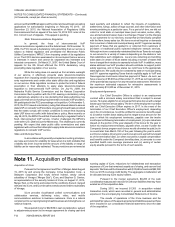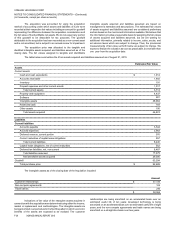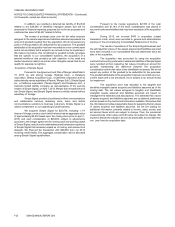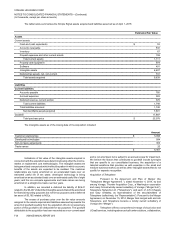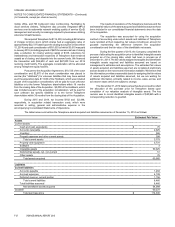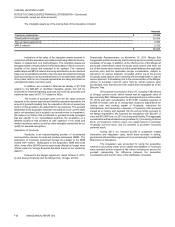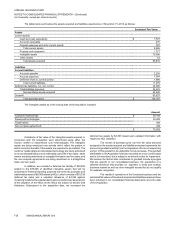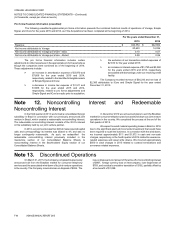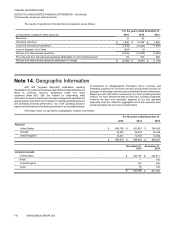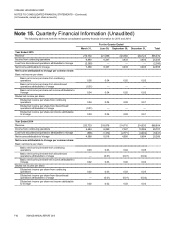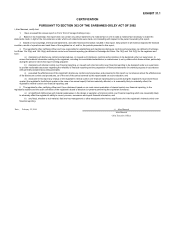Vonage 2015 Annual Report Download - page 93
Download and view the complete annual report
Please find page 93 of the 2015 Vonage annual report below. You can navigate through the pages in the report by either clicking on the pages listed below, or by using the keyword search tool below to find specific information within the annual report.
VONAGE HOLDINGS CORP.
NOTES TO CONSOLIDATED FINANCIAL STATEMENTS—(Continued)
(In thousands, except per share amounts)
F-33 VONAGE ANNUAL REPORT 2015
announced that OMB had approved the order and would begin accepting
applications for authorization beginning on February 18, 2015. On
December 23, 2015, the National Association of Regulatory Utility
Commissioners filed an appeal of the June 18, 2015 FCC order at the
D.C. Circuit Court of Appeals. This appeal is pending.
State Telecommunications Regulation
In general, the focus of interconnected VoIP
telecommunications regulation is at the federal level. On November 12,
2004, the FCC issued a declaratory ruling providing that our service is
subject to federal regulation and preempted the Minnesota Public
Utilities Commission (“MPUC”) from imposing certain of its regulations
on us. The FCC's decision was based on its conclusion that our service
is interstate in nature and cannot be separated into interstate and
intrastate components. On March 21, 2007, the United States Court of
Appeals for the 8th Circuit affirmed the FCC's declaratory ruling
preempting state regulation of our service.
While this ruling does not exempt us from all state oversight
of our service, it effectively prevents state telecommunications
regulators from imposing certain burdensome and inconsistent market
entry requirements and certain other state utility rules and regulations
on our service. State regulators continue to probe the limits of federal
preemption in their attempts to apply state telecommunications
regulation to interconnected VoIP service. On July 16, 2009, the
Nebraska Public Service Commission and the Kansas Corporation
Commission filed a petition with the FCC seeking a declaratory ruling
or, alternatively, adoption of a rule declaring that state authorities may
apply universal service funding requirements to nomadic VoIP providers.
We participated in the FCC proceedings on the petition. On November 5,
2010, the FCC issued a declaratory ruling that allowed states to assess
state USF on nomadic VoIP providers on a going forward basis provided
that the states comply with certain conditions to ensure that imposing
state USF does not conflict with federal law or policy. More recently on
July 28, 2015, the MPUC found that it has authority to regulate Charter’s
fixed, interconnected VoIP service. Charter challenged the MPUC’s
order at the U.S. District Court for Minnesota. This challenge is currently
pending. We expect that state public utility commissions and state
legislators will continue their attempts to apply state telecommunications
regulations to nomadic VoIP service.
State and Municipal Taxes
In accordance with generally accepted accounting principles,
we make a provision for a liability for taxes when it is both probable that
a liability has been incurred and the amount of the liability or range of
liability can be reasonably estimated. These provisions are reviewed at
least quarterly and adjusted to reflect the impacts of negotiations,
settlements, rulings, advice of legal counsel, and other information and
events pertaining to a particular case. For a period of time, we did not
collect or remit state or municipal taxes (such as sales, excise, utility,
use, and ad valorem taxes), fees or surcharges (“Taxes”) on the charges
to our customers for our services, except that we historically complied
with the New Jersey sales tax. We have received inquiries or demands
from a number of state and municipal taxing and 911 agencies seeking
payment of Taxes that are applied to or collected from customers of
providers of traditional public switched telephone network services.
Although we have consistently maintained that these Taxes do not apply
to our service for a variety of reasons depending on the statute or rule
that establishes such obligations, we are now collecting and remitting
sales taxes in certain of those states including a number of states that
have changed their statutes to expressly include VoIP. In addition, many
states address how VoIP providers should contribute to support public
safety agencies, and in those states we remit fees to the appropriate
state agencies. We could also be contacted by state or municipal taxing
and 911 agencies regarding Taxes that do explicitly apply to VoIP and
these agencies could seek retroactive payment of Taxes. As such, we
have a reserve of $3,903 as of December 31, 2015 as our best estimate
of the potential tax exposure for any retroactive assessment. We believe
the maximum estimated exposure for retroactive assessments is
approximately $12,000 as of December 31, 2015.
Employment Agreements
Our Chief Executive Officer is subject to an employment
contract with a minimum salary commitment that is subject to annual
review. He is also eligible for an annual performance bonus with a target
based upon his then annual salary. The term of the employment contract
with our Chief Executive Officer expires in 2017. In the event of the
termination of our Chief Executive Officer’s employment, depending
upon the circumstances, he will be entitled to severance benefits equal
to (i) twelve months base salary plus his target bonus amount for the
year in which his employment terminates, payable over the twelve
months period following termination of employment, (ii) a pro rata share
(based on the portion of the year elapsed) of his bonus for the year in
which his employment terminates, payable when, as and if under the
Company’s bonus program such bonus would otherwise be paid, but in
no event later than March 15th of the year following the year to which
such bonus relates, (iii) any prior year bonus amounts earned but unpaid
as of the termination date, (iv) other accrued but unpaid compensation
and benefits under the Company’s benefits plans, (v) amounts to cover
specified health care coverage premiums and (vi) vesting of certain
equity awards pursuant to the terms of such awards.
Note 11. Acquisition of Business
Acquisition of iCore
Pursuant to the Agreement and Plan of Merger dated August
19, 2015 by and among the Company, Cirrus Acquisition Corp., a
Delaware corporation and newly formed indirect, wholly owned
subsidiary of Vonage (“Merger Sub”), iCore, and Stephen G. Canton,
as representative of the security holders of iCore, on August 31, 2015,
Merger Sub, on the terms and subject to the conditions thereof, merged
with and into iCore, and iCore became a wholly owned indirect subsidiary
of Vonage.
iCore provides cloud-based unified communications and
collaboration services, delivering voice, video, and mobile
communications solutions to business customers. iCore is a natural
complement to our rapid growing UCaaS business and strengthens our
national footprint.
We acquired iCore for $92,689 in cash consideration, subject
to adjustments pursuant to the merger agreement for closing cash and
working capital of iCore, reductions for indebtedness and transaction
expenses of iCore that remained unpaid as of closing, and escrow fund
deposits. We financed the transaction with $10,689 of cash and $82,000
from our 2015 revolving credit facility. The aggregate consideration will
be allocated among iCore equity holders.
Pursuant to the merger agreement, $9,200 of the cash
consideration was placed in escrow for unknown liabilities that may have
existed as of the acquisition date.
During 2015, we incurred $1,353 in acquisition related
transaction costs, which were recorded in general and administrative
expense in the accompanying Consolidated Statements of Income.
The results of operations of the iCore business and the
estimated fair values of the assets acquired and liabilities assumed have
been included in our consolidated financial statements since the date
of the acquisition.



